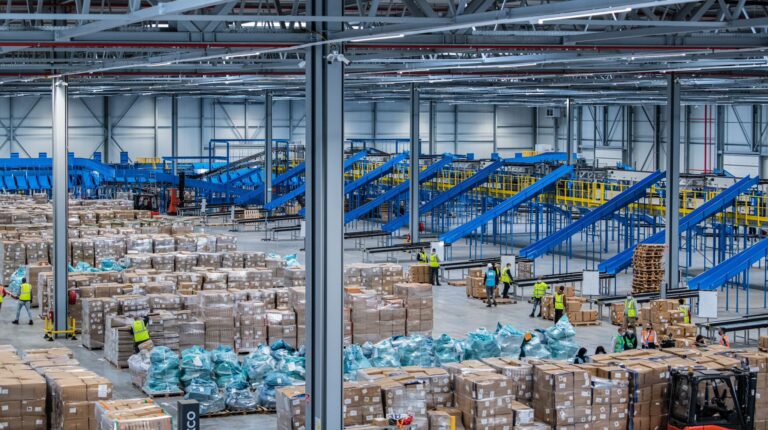As e-commerce competition continues to intensify, Chinese logistics giants JD Logistics, SF Express and Cainiao (Alibaba’s logistics arm) are steadily extending their reach into the European market. Although their presence is still emerging, these early moves hint at a broader strategic ambition: to secure a stronger role in supply chains, enhance delivery speed and gain direct access to European consumers.
This push is likely to be accelerated by geopolitical pressures, primarily the fallout from the US-China tariff war initiated under President Trump, which will accelerate Chinese efforts to diversify trade routes and reduce reliance on American logistics infrastructure.
Indeed, given the uncertainty surrounding trade with the US, it’s no surprise that Chinese courier, express and parcel (CEP) players are turning their focus toward Europe. With over 500 million consumers across the EU, UK, Switzerland and Norway, the region presents a vast and comparatively stable market – making it an increasingly attractive target for strategic expansion.
A two-way supply chain play
JD Logistics has launched a cross-border express delivery service, covering much of Europe. Originating from hubs in Shenzhen and Guangzhou, it offers one-hour pickup and full tracking via its WeChat-based JD Express platform.
The company is actively pursuing partnerships to deepen its European footprint. Collaborations with France’s GeoPost and the UK’s Evri are geared toward creating a seamless two-way logistics corridor between China and Europe.
Notably, JD is reported to have considered participating in the £2bn (US$2.6bn) acquisition of Evri by Apollo Funds, a move that would have marked one of the most significant Chinese takeovers in the European CEP space.
Infrastructure is also a priority. JD has invested in a cutting-edge logistics center in Venlo in the Netherlands, employing autonomous vehicles and robotic arms to boost operational efficiency and scalability.
In Poland, JD Logistics has been a key player with major clients such as Biedronka. The company recently opened its second warehouse in Warsaw, bringing its total to three warehouses in Poland. Additionally, JD operates an almost 30,000m2 fully automated warehouse in Poznań, reinforcing its commitment to scalable and high-tech logistics solutions in Central Europe.
As JD Logistics expands its European network, it continues to create new opportunities for Chinese businesses seeking fast, reliable and tech-driven access to European consumers, strengthening trade links and enabling smoother market entry across the continent.
“I see Europe as a strategic opportunity for smart, efficient and borderless logistics. Our investments in Poland and beyond reflect our long-term commitment to creating seamless connections between Chinese innovation and European demand,” says Veysel Isik, European local sales director at JD Logistics.
Building physical and digital bridges
SF Express, sometimes described as ‘China’s FedEx’, is using a combination of air freight and regional distribution hubs to establish a pan-European presence. It recently launched a direct B747 air cargo route between Europe and China, aiming to accelerate shipments of high-value goods such as electronics.
Crucially, SF Express possesses substantial capacity for air freight to China and the surrounding region through its subsidiary, SF Airlines, which operates a fleet of 90 dedicated cargo aircraft, making it China’s largest all-cargo airline. This gives SF a strong strategic edge in offering high-frequency and reliable air cargo services between Asia and Europe.
In Spain, the firm has opened a 30,000m2 self-operated warehouse and established robust last-mile capabilities across Iberia. SF Express has also struck a strategic partnership with GLS, integrating IT systems and delivery networks to offer a more unified customer experience throughout the EU. Moreover, there are rumors that it is currently hiring in Central and Eastern Europe, which would imply a stronger presence in what is one of the key gateways from China into the European Union.
It will be especially interesting to see what SF Express does next; there are still a few local heroes on the market, but with its own airline capacity to China and the region, it’s likely to be in high demand, both as a service provider and possibly as an acquirer.
Locking down Europe
Cainiao is pursuing a full-spectrum European strategy, from parcel lockers and sortation centers to weekend delivery. At the heart of its European operation is the Liege eHub in Belgium, which acts as a logistics nerve center linking air freight, rail and sea routes. While I have some doubts about its parcel locker joint venture with DHL, it demonstrates that Cainiao understands the need for partnerships to achieve its strategic goals.
The company’s ‘five-day delivery guarantee’ now spans multiple EU countries, with weekend deliveries operational in Spain’s major cities. In Poland, Cainiao has joined forces with DHL to invest €60m (US$67m) in one of the largest parcel locker networks in the country, bringing self-service convenience to urban and rural consumers alike.
More tellingly, Alibaba has recently moved to take full ownership of Cainiao, underscoring how central the logistics unit is to the group’s overseas growth plans, particularly as it faces rising competition from Shein and Temu. While large CEP acquisitions have not been the case to date, this may change in the face of the new competitive environment.
“Our expansion in Europe reflects Cainiao’s commitment to building a smarter, faster and more consumer-centric logistics network,” explains Dennis Li, general manager of cross border parcels at Cainiao Network Europe. “From the Liege eHub to our parcel locker investments, we’re laying the foundations for a truly integrated cross-border infrastructure – one that empowers merchants and delights customers across the region.”
Strategic implications for Europe
The Chinese dragon is no longer at the door – it’s already setting up shop. These moves signify more than just faster delivery. Chinese CEP players may well help reshape Europe’s logistics ecosystem, bringing advanced automation, high-frequency delivery models and aggressive investment strategies that could challenge established incumbents like Geopost/DPD, DHL and GLS/Royal Mail.
For European businesses and consumers, the benefits may include faster shipping, greater convenience and better cross-border options. But for regulators and local operators, the growing influence of Chinese logistics firms also raises strategic questions about data, infrastructure ownership and long-term market control.


